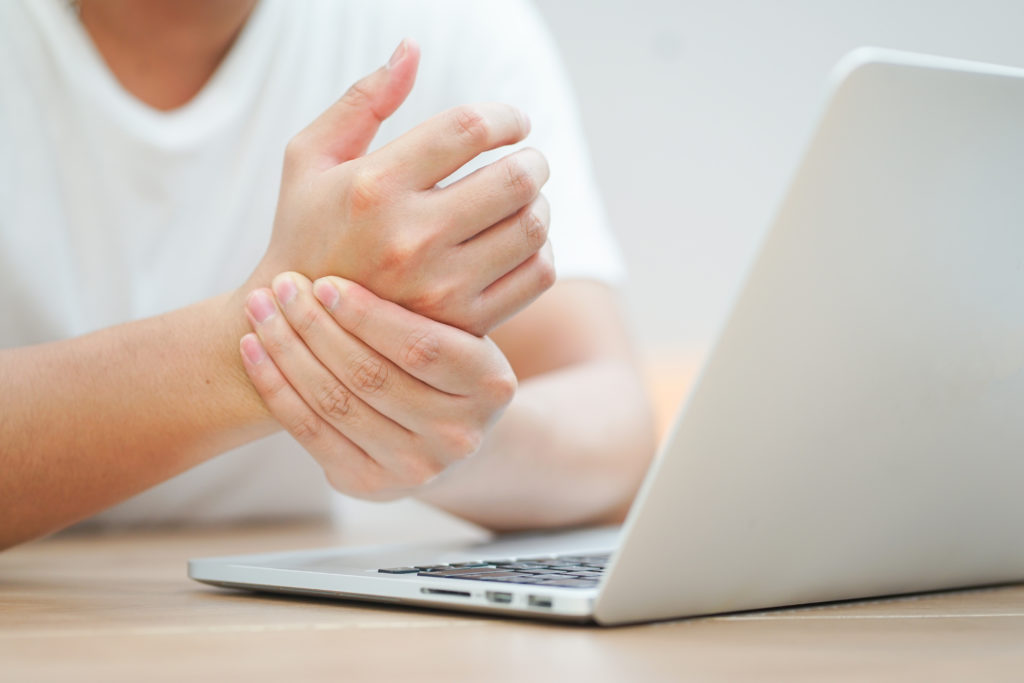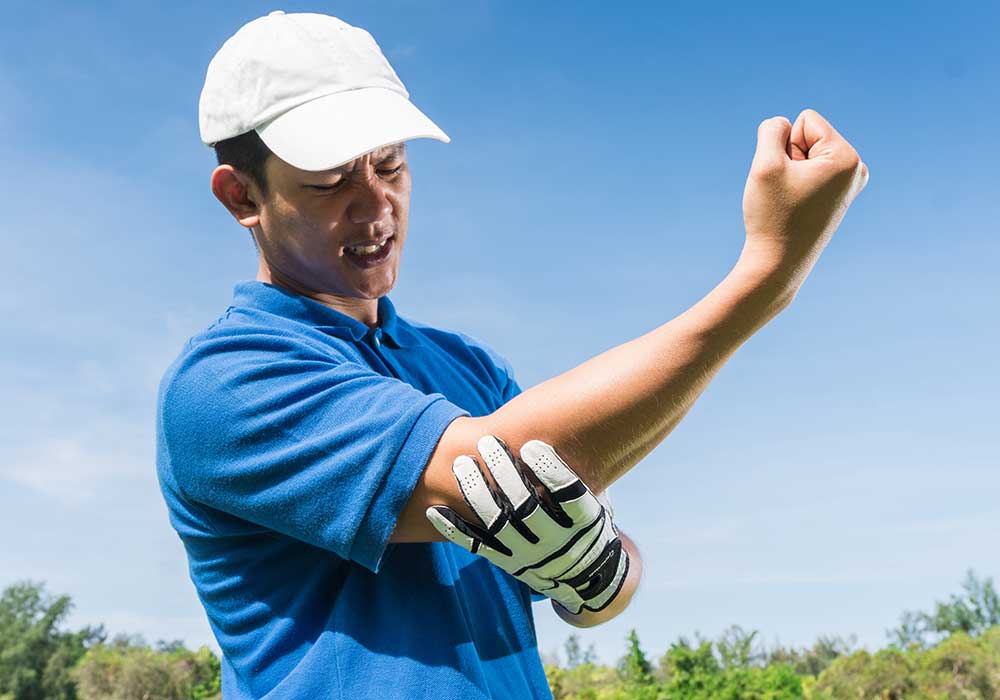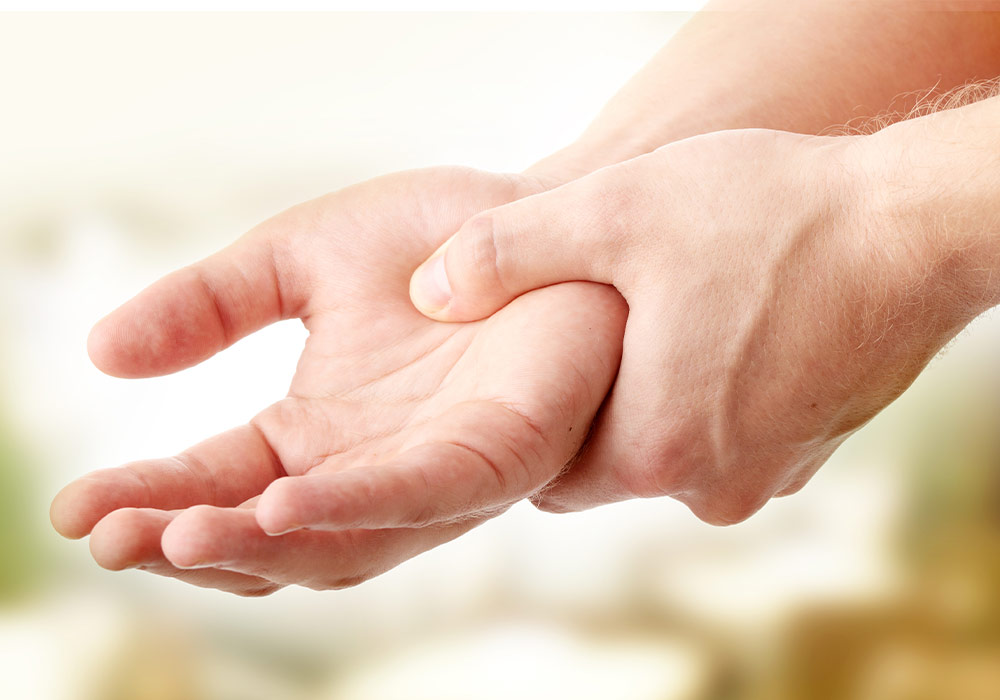THIS POST IS PART OF THE ULTIMATE GUIDE TO HAND, WRIST AND ELBOW INJURIES
Arthritis is an inflammation of one or more of your joints. When the body’s joints are affected by arthritis, living a normal lifestyle or performing simple daily activities can be difficult or nearly impossible.
Because the hand and wrist have multiple small joints that work together to produce motion, when arthritis develops in those joints it can be very painful and limit normal motion.
In your joints, the ends of the bones are covered with articular cartilage, a gliding surface that helps the bones move smoothly over each other during movement. Joints are also surrounded by a thin lining called synovium. Synovium produces a fluid that lubricates the cartilage and reduces friction during movement.
When arthritis occurs the onset of symptoms is gradual and the cartilage in the joint decreases slowly.
What causes arthritis in the hands or wrist?
- Osteoarthritis: Mostly related to old age, it usually occurs in people over 50 years old, but can occur in younger people as well. The cartilage that cushions the joint softens and wears away. The bones then rub against one another causing hand, wrist or finger pain and stiffness. Osteoarthritis develops slowly and worsens over time.
- Rheumatoid arthritis: This is the most common form of a group of disorders
referred to as inflammatory arthritis. Most often, rheumatoid arthritis starts
in the foot and ankle and can affect multiple joints throughout the body. It is
symmetrical, so it affects the same joint on both sides of the body.
This is an autoimmune disease where the immune system attacks its own tissues. Immune cells attack the synovium covering the joint, causing it to swell. Overtime, the synovium invades and damages the bone and cartilage, as well as ligaments and tendons and may cause serious joint deformity and disability. - Post-traumatic arthritis: Develops after an injury to the hand, wrist or fingers. This causes the cartilage between joints to wear away and can develop many years after the initial injury. An injured joint is much more likely than an uninjured joint to become arthritic even if the injury is properly treated.
Symptoms of arthritis in the hand, wrist or fingers
- Pain with motion
- Pain that flares up with vigorous activity
- Tenderness when pressure is applied to the joint
- Joint swelling
- Increased pain and swelling in the morning
- Difficulty moving hand, wrist or fingers
Physician examination
A hand, wrist and elbow specialist can diagnose arthritis by performing a physical exam and looking at your X-rays. Sometimes an MRI or bone scan is necessary to rule out other problems.
MAKE AN APPOINTMENT WITH A HAND, WRIST OR ELBOW SPECIALIST
How do you treat arthritis in the fingers, hand or wrist?
Treatment for arthritis of the hand, wrist or fingers depends on a variety of factors. Including:
- How far the arthritis has progressed
- How many joints are involved
- Your age or other medical conditions
- Activity level
- Your personal goals
- If your dominant or non-dominant hand is affected
Nonsurgical treatment options
- Medications: The most common medications for arthritis are anti-inflammatories, such as ibuprofen or aspirin, which stops the body from producing chemicals that cause joint swelling and pain.
- Rheumatology doctor: A rheumatologist has special training in diseases that affect your joints, muscles and bones, including arthritis.
- Injections: An injection typically contains a steroid and long-lasting anesthetic which can provide pain relief for weeks to months. Injections can be repeated but only a limited number of times during a certain time period.
- Splinting: Splinting can be used in conjunction with injections to help support the arthritic joint. Splints are usually worn during periods where the joint hurts; however, wearing a splint non-stop can lead to muscle deterioration. Therefore, a splint should still allow functional use of the hand and be removed when periods of pain subside.
- Hand therapy: A hand therapist can teach you exercises to help you move your wrist or hand and make them stronger. They can also show you how to ease the strain on your hand or wrist during your daily or work activities.
Surgical treatment for hand or wrist arthritis
If nonsurgical treatment fails to provide relief, your hand, wrist and elbow specialist may suggest surgery as the next step. Your surgeon will determine the best surgery for you based on your individual needs.
If the joint can be reconstructed or preserved to provide long-term pain relief with return to function, your surgeon will suggest that option. However, a joint replacement or fusion is usually considered if the damage has progressed to a point that the surfaces no longer work.
- Joint fusion: This option provides pain relief but limits joint motion.
- Joint replacement: Like a hip or knee replacement, certain joints in the hand or wrist are replaced to improve motion and function.
Recovery
After surgery you will work with a hand therapist to regain motion and strength in your hand or wrist. Your hand may be in a cast or splint for a period of time. At your first follow-up appointment your splint or cast may be changed and you will start rehabilitation with your hand therapist. Length of recovery time depends on the extent of the surgery.

Schedule an appointment
Your well-being is important to us. Click the button below or call us to schedule an appointment with one of our orthopedic specialists. If your injury or condition is recent, you can walk right into one of our OrthoIndy Urgent Care locations for immediate care. For rehabilitation and physical therapy, no referral is needed to see one of our physical therapists.





